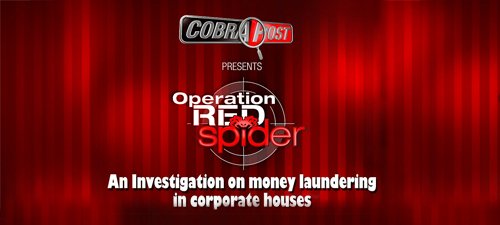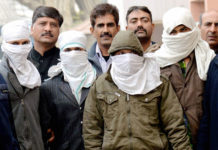“Ek hota hai number do ka paisa theek hai. Ab number do ka paisa number one kaise banana hai that is also a problem. Hum wo bhi kar sakte hain (One type of money is No. 2, is that right? Now making number two money number one, that is also a problem. We can do that also.” – A.K. Bansal
Posing as a front man of some politician, the Cobrapost journalist first met A.K. Bansal, Assistant Manager (Operations), at this branch of Axis Bank in Ghaziabad, Uttar Pradesh. Sitting across the table, the reporter tells A. Bansal upfront: A certain politician wants to invest Rs. 50 lakh of black money, to ‘start with.’ The purpose: to make the money white and bring in good returns. The investment has to be made in three names: that of the front man’s, his wife and the politician’s wife. Rs. 5–7 crore is coming in February. Would he suggest something ‘safe’?
It is up to you whether you route through an account or do it direct. Bansal is prompt to make the client comfortable with this assurance: “Aap jaise chahte haim hum waise kar sakte hain (We can do it whichever way you want it).” Lowering his voice a bit, Bansal lets out a secret: “Ek hota hai number do ka paisa theek hai. Ab number do ka paisa number one kaise banana hai that is also a problem. Hum wo bhi kar sakte hain (One type of money is No. 2, is that right? Now making number two money number one, that is also a problem. We can do that also.”
Opening an account is not that necessary, Bansal says, although they will open one for the client. But all the money should not be routed through the account. He explains thus: “Account hum khol denge koi dikkat nahin lekin uske through hum transactions route nahin karenge wo kyun agar transactions route karenge to number ek ka paisa ho jayega … lekin us account se zyada route nahin karenge (We will open an account, no problem. But we will not route the transactions through it. The reason is if we route transactions through that account the money coming out then has to be white … we will not route much through that account).” At the most, Rs. 1–2 lakh would be routed through it.
Then how would the big chunk routed to investment? Bansal has another ace up his sleeve. He claims: “Baaki hum doosre account ke through… humare paas aise kuchh hote hain … uske through hum kar sakte hain (The rest we will do through other accounts, we have some such accounts, we can do it through them).” You mean you will do it using dummy accounts, asks the reporter? Replies Bansal in affirmative: “Haan (Yes).”
It is better to invest Rs. 50–60 lakh in a diversified portfolio, advises Bansal. Would we have to pay charges for using the dummy accounts? Bansal says no but then says he will find it out with his senior. The bigger concern of the client is, however, the bigger money that is going to come soon. Upon this, Bansal takes the journalist to his superior, Branch Head A.K. Gupta. If Bansal was an amicable and hospitable soul so was his boss.
Pleasantries over, the front man tells them in a lighter banter that they are like doctors to him. The branch head returns with the same bonhomie: “Aap apni jo bimari hai wo poori bata dijiye (You tell me the disease you have). Then, Alok comes straight to the point and asks in a matter-of-fact manner: “Ye jo aya hai apne paas ye number two mein hai ya number one mein (What you have is number two or number one).” This leaves nothing to imagination.
It is “number two” and in cash. No problem, Gupta assures. The minister is expecting Rs. 5–7 crore in the first week of February. And it all meant to be invested. Pondering over the issue for a moment, Gupta asks: “Isko kitne time mein humein number ek ka karna hai … jab aap thoda time doge aap mereko to pakke mein kaam hoga (In how much time you want us to make it number one … when you give me some time only then would it be a thorough job).”
Take your time. We are not in a rush. But in no case should the name of the minister come to light. Assures Gupta: “Kisi ka naam nahin ayega (Nobody’s name will come to light).”
What is the calling of the politician, asks Gupta? We dabble in real estate and things like that. Gupta puts the question: “Real estate mein kitna … apne paas land bank kitna hai (How much in real estate … how big a land bank you have)?” He then begins to give the issue a serious thought, and why we come to know a little later.
After dabbling in various options, like buying shares of NBFC or private companies, Gupta suggests the journalist to show his crores as proceeds from the sale of property. If you sell a property, you enter into an agreement with the buyer detailing the mode and period of payment, in the deed under the seal of a notary. Now, suppose the buyer fails to fulfill his part of agreement, his money gets forfeited, and you can show it as your legitimate income. He says: “Yadi ye fail ho jate hain to jo inhone diya hua hai wo andar aa jayega …theek, to wo jo khula hua hai wo number ek ka ho jata hai aur wo andar chala jata hai … pucca method hai (If he fails then whatever he has paid will come in …correct? So the money thus shown as receipt is taken in …it is a solid method).” The second option he suggests is invest in long-term equity. Both these methods are ‘foolproof’ provided the documentation is ‘strong.’ However, this kind of service carries a price tag. Informs Alok: “Is kahani mein bhai sahib dekho char se panch per cent ka kharcha ata hai (Look brother, this whole story entails an expense of 4–5% to materialize).”
With Rs. 5 crore to clean this way, how much it would cost? Says Alok with promptness: “Pachees lakh (Twenty-five lakh).”
This 4–5% cost includes the cost of the CA who will file the return. Since it is bound to come under scrutiny, the CA will also clear it. He explains how it will happen: “Return file wo karga plus case scrutiny mein ayeaga hi ayega … usko clear bhi wahi karega … kahin se kahin koi challenge nahin karega … aapka sab kaam pukhta (He will file the return plus the case would certainly come under scrutiny. He will get it cleared as well …nowhere would it be challenged …all the job will be foolproof).” The person who he entrusts this task is a ‘close friend.’ He takes 1%. The rest goes to people down the line.
It won’t be safe to keep Rs. 5–7 crore cash at home. Would they provide a locker, asked the front man, the journalist, on behalf of his master, the minister? Alok says they don’t have that big lockers but he can provide two.
The minister’s wife often goes to England. Could those 5–7 crores be transferred there? Asks Alok promptly: “Hawala?” Expressing his inability to do this, Alok advises not to do it through the bank. He nonetheless says he will explore the possibility if it could be done through hawala channels.
Has he ever handled such transactions on behalf of some politicians like his master? Alok tells about a case involving some politician who had bought a company for Rs 22 crore. He says: “Koi politics se hi related the… Bank of Baroda mein ek company jo hai NPA hui thi…us company ko unhone kharida tha….wo company thi baais crore ki… baais crore ek number ka paisa nahi hota…wo bhi cash se poora… poore process mein humne chaar–chhe mahine laga diye the… satve mahine mein case clear ho gaya tha (He was someone related to politics. A company had gone NPA with the Bank of Baroda. He bought the company. That company was bid at Rs. 22 crore. Twenty-two crore is not something number one, that too wholly in cash. It took me four-six months to complete the process. The case got cleared on the seventh month).” In such trade as this experience counts.
A. K. Bansal’s reaction to the investigation: At first he is willing to accept any amount of crores, the moment he comes to know the real identity of the reporter, he gets into denial mode.
A. K. Gupta’s reaction to the investigation: Willing to accept as much cash as can be put on the table. But later goes on to refuse everything about what he had to our reporter on investing black money




























